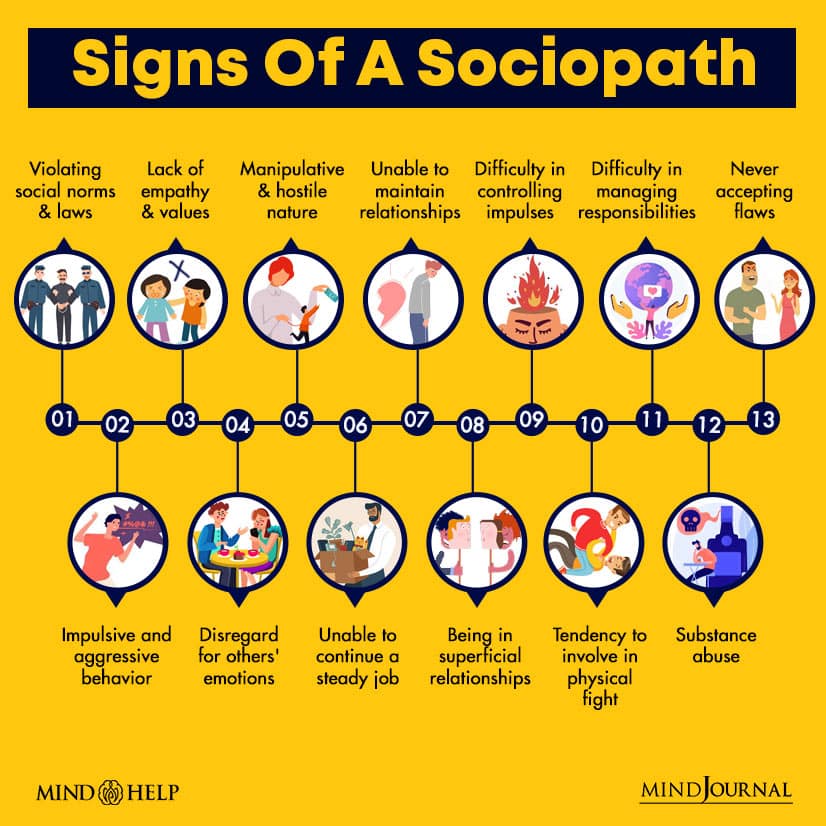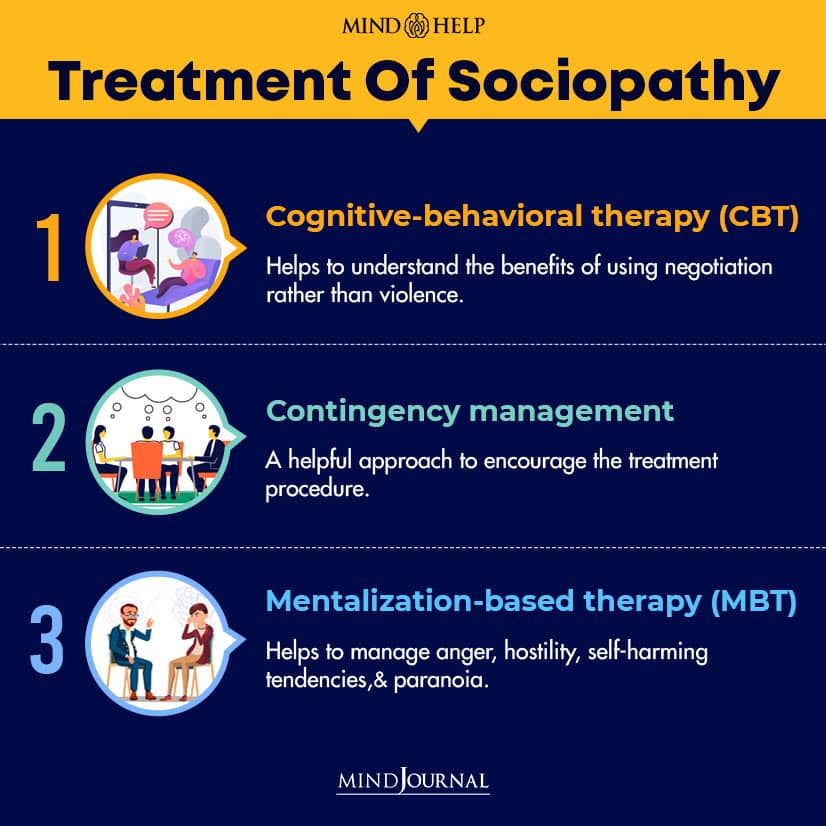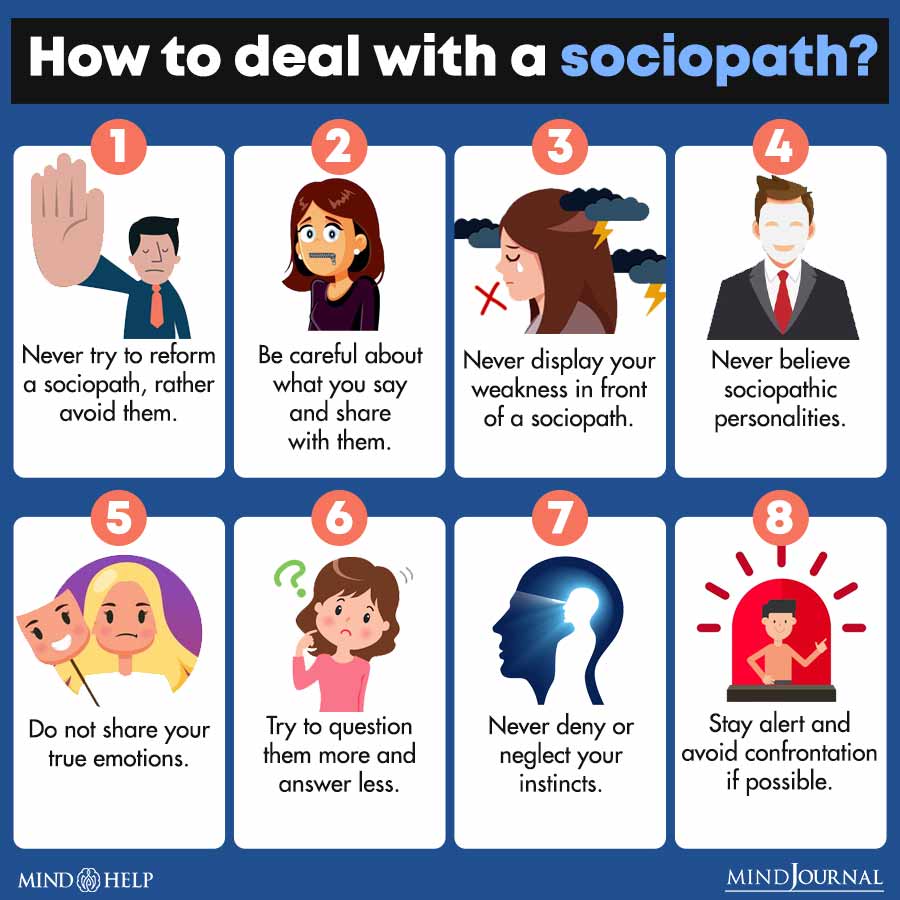Table of Contents
Sociopath refers to an individual who is suffering from antisocial personality disorder (ASPD). It is a mental health condition where a person often shows a lack of empathy, violates others’ feelings, and engages in criminal and antisocial behavior.
What Is A Sociopath?
A sociopath is a person who has antisocial personality disorder (ASPD), a psychological condition characterized by antisocial, criminal, or irresponsible behavior, manipulative nature for personal gain, lack of empathy for others’ rights or feelings, disregard of social norms, and lack of remorse for wrongdoings.
The term ‘Sociopath’ is derived from the word ‘sociopathy’ which refers to a pattern of antisocial attitudes and behaviors. The term is often used for describing ASPD and psychologists don’t diagnose people as sociopaths, rather they use the term ASPD patients. However, there is no clinical definition of a sociopath in the mental health handbook Diagnostic and Statistical Manual of Mental Disorders (DSM).
A 2010 research paper 1 Crusio, W. E. (2004). The sociobiology of sociopathy: An alternative hypothesis. Behavioral and Brain Sciences, 27(01). https://doi.org/10.1017/s0140525x04220040 explained that a person with a sociopathic nature tends to draw our attention because of the excessive amount of crime they commit and most of us cannot comprehend the cold, detached, and the merciless way they harm and manipulate others for their personal gain.
Having disregard for others’ rights, emotions or feelings is one of the most common traits that can be observed in sociopaths, and these negative traits have some serious impacts on their personal as well as professional growth, such as difficulty in sustaining consistent employment or inability to maintain a stable relationship, according to a recent study 2 Fisher KA, Hany M. Antisocial Personality Disorder. [Updated 2021 May 21]. In: StatPearls [Internet]. Treasure Island (FL): StatPearls Publishing; 2021 Jan-. Available from: https://www.ncbi.nlm.nih.gov/books/NBK546673/ .
Understanding Sociopathy
Sociopathy is closely interlinked with ASPD and nature & nurture plays a significant role in this personality disorder. It is believed that a person who experiences an interruption in his/her personality development because of any childhood trauma or abuse 3 Bruce, M., & Laporte, D. (2015). Childhood trauma, antisocial personality typologies and recent violent acts among inpatient males with severe mental illness: exploring an explanatory pathway. Schizophrenia research, 162(1-3), 285–290. https://doi.org/10.1016/j.schres.2014.12.028 is more likely to have a sociopathic nature. Many assume that people with ASPD are quite easy to spot, but in reality, many are still unaware of this disorder and it can often be difficult to diagnose. People with sociopathic tendencies find it extremely difficult to understand others’ feelings. There are some common traits observed in sociopaths that can be identified during their diagnosis of ASPD.
Sociopath Vs. Psychopath
The term ‘sociopath’ is often confused with ‘psychopath’ as many experts suggest that there is no significant difference between both terms in clinical settings. Mental health specialists don’t officially diagnose someone as a sociopath or psychopath, but they believe that both conditions are closely associated with ASPD.
But many researchers argue that there is a significant distinction between these two. They believe that sociopaths behave less consistently, as compared to psychopaths. A 2019 research 4 Johnson SA. Understanding the violent personality: antisocial personality disorder, psychopathy, & sociopathy explored. Forensic Res Criminol Int J. 2019;7(2):76‒88. DOI: 10.15406/frcij.2019.07.00267 reveals that people with sociopathic nature often experience anxiety and find it difficult to control their anger, while psychopaths are more likely to have controlled and charming personalities.
Psychopathy involves more planned behavior but it might not be necessarily violent or rude. Studies 5 Cima, M., Tonnaer, F., & Hauser, M. D. (2010). Psychopaths know right from wrong but don’t care. Social cognitive and affective neuroscience, 5(1), 59–67. https://doi.org/10.1093/scan/nsp051 highlighted another key difference which is psychopaths have no conscience, the inner voice that warns us that we are doing something morally wrong. But sociopath personalities do have a conscience though it may be weak.
Signs Of A Sociopath

A person who acts aggressively or behaves selfishly doesn’t need to be a sociopath as different people have different personality traits. Though there is no standard list, sociopaths share some common and consistent behavioral patterns, such as:
- Violating social norms and laws, such as overstepping social boundaries and breaking rules at educational institutions or harassing, or stalking someone, destroying others’ properties 6 Rosenberger, L. A., Pfabigan, D. M., Lehner, B., Keckeis, K., Seidel, E. M., Eisenegger, C., & Lamm, C. (2019). Fairness norm violations in anti-social psychopathic offenders in a repeated trust game. Translational psychiatry, 9(1), 266. https://doi.org/10.1038/s41398-019-0606-3
- Impulsive, violent, erratic, and aggressive behavior, having lack of empathy and value 7 Alcorn, J. L., 3rd, Gowin, J. L., Green, C. E., Swann, A. C., Moeller, F. G., & Lane, S. D. (2013). Aggression, impulsivity, and psychopathic traits in combined antisocial personality disorder and substance use disorder. The Journal of neuropsychiatry and clinical neurosciences, 25(3), 229–232. https://doi.org/10.1176/appi.neuropsych.12030060
- Having no respect for others’ feelings and emotions 8 Fisher, K. A., & Hany, M. (2021). Antisocial Personality Disorder. In StatPearls. StatPearls Publishing.
- Using intelligence and charm to manipulate others 9 Werner, K. B., Few, L. R., & Bucholz, K. K. (2015). Epidemiology, Comorbidity, and Behavioral Genetics of Antisocial Personality Disorder and Psychopathy. Psychiatric annals, 45(4), 195–199. https://doi.org/10.3928/00485713-20150401-08
- Having difficulty in recognizing others’ emotions 10 Gawda B. (2013). The emotional lexicon of individuals diagnosed with antisocial personality disorder. Journal of psycholinguistic research, 42(6), 571–580. https://doi.org/10.1007/s10936-012-9237-z
- Not learning from past mistakes or punishments
- Feeling of hostility, envy, hatred
- Unable to continue a steady job or maintain a long-term relationship
- Having difficulty in controlling impulses and acting without thinking about the consequences 11 Fariba K, Gokarakonda SB. Impulse Control Disorders. [Updated 2021 Aug 30]. In: StatPearls [Internet]. Treasure Island (FL): StatPearls Publishing; 2021 Jan-. Available from: https://www.ncbi.nlm.nih.gov/books/NBK562279/
- Disregard for personal and others’ safety 12 Antisocial personality disorder: prevention and management. London: National Institute for Health and Care Excellence (NICE); 2013 Mar. (NICE Clinical Guidelines, No. 77.) Available from: https://www.ncbi.nlm.nih.gov/books/NBK555205/
- Being in superficial relationships
- Tendency to involve in physical violence or fight 13 Moeller, F. G., & Dougherty, D. M. (2001). Antisocial personality disorder, alcohol, and aggression. Alcohol research & health : the journal of the National Institute on Alcohol Abuse and Alcoholism, 25(1), 5–11.
- Having difficulty in managing responsibilities, such as work, paying bills, and handling important household tasks
- Trying to control others by threatening them
- Substance abuse 14 Westermeyer, J., & Thuras, P. (2005). Association of antisocial personality disorder and substance disorder morbidity in a clinical sample. The American journal of drug and alcohol abuse, 31(1), 93–110.
- Trying to be charming in front of others until their self-interest is fulfilled 15 Rodrigo, C., Rajapakse, S., & Jayananda, G. (2010). The ‘antisocial’ person: an insight in to biology, classification and current evidence on treatment. Annals of general psychiatry, 9, 31. https://doi.org/10.1186/1744-859X-9-31
- Not accepting the negative aspects of their behavior
Read More About Personality Here
Causes Of Developing A Sociopathic Personality
Researchers 16 Tuvblad, C., & Beaver, K. M. (2013). Genetic and environmental influences on antisocial behavior. Journal of criminal justice, 41(5), 273–276. https://doi.org/10.1016/j.jcrimjus.2013.07.007 have argued that sociopathy is more of a human personality related to environmental factors rather than a genetic one. Though inherited genes and brain chemistry play a role in the development of ASPD, childhood experiences, parenting style, and other environmental factors are believed to be the leading causes.
Studies 17 Dargis, M., Newman, J., & Koenigs, M. (2016). Clarifying the link between childhood abuse history and psychopathic traits in adult criminal offenders. Personality disorders, 7(3), 221–228. https://doi.org/10.1037/per0000147 have shown that people who have experienced trauma and abuse during their childhood are more likely to suffer from ASPD later in life. This study explained that people who don’t receive proper attention and care from parents during childhood tend to have a thought process that they need to take care of themselves.
Similarly, children experiencing trauma, abuse, manipulation in their household are more prone to have a negative attitude towards life as they navigate their own conflicts. However, a 2014 research paper 18 Séguin J. R. (2009). The frontal lobe and aggression. The European journal of developmental psychology, 6(1), 100–119. https://doi.org/10.1080/17405620701669871 suggests that a person who has experienced trauma or damage to the frontal lobes of their brain due to any head injury or dementia is also at risk to develop antisocial behavior.
Diagnosis Of Sociopathy
Sociopathy is not a clinical disorder mentioned by the DSM-5 and psychologists don’t officially diagnose people as sociopaths. But mental health therapists often use the DSM-5 to diagnose ASPD. DSM-5 19 Black D. W. (2015). The Natural History of Antisocial Personality Disorder. Canadian journal of psychiatry. Revue canadienne de psychiatrie, 60(7), 309–314. https://doi.org/10.1177/070674371506000703 has mentioned that one has ASPD if he/she is experiencing three or more traits of the following:
- Breaks social rules and law sometimes knowingly
- Lacks conscience
- Feels little guilty for the harm they cause to others
- Control or manipulate others
- Has a lying or deceiving nature
- Prone to engage in conflicts
- Has no value of others’ emotions
Along with the signs, there are some other criteria also, such as:
- The person should be 18 years old or above.
- The behaviors should appear across multiple areas of life.
- The antisocial traits should not be the symptoms of schizophrenia or bipolar disorder.
During the process of diagnosis, a professional may ask the following questions:
- About the person’s feelings, thoughts, behavior, the status of personal and professional relationships
- About the person’s medical history
- Contact with the person’s loved ones to know about the person’s behavior
Treatment Of Sociopathy

People living with such negative personality traits often don’t agree to consult with a mental health professional or seek therapy. They might choose to take professional support if prompted by a court order or advised by a loved one. There are a few treatments but they can benefit a sociopath only if the person is willing to put in the effort. Here are some of the psychotherapies that can effectively help a person to manage their antisocial behavior:
1. Cognitive-behavioral therapy (CBT)
CBT 20 Matusiewicz, A. K., Hopwood, C. J., Banducci, A. N., & Lejuez, C. W. (2010). The effectiveness of cognitive behavioral therapy for personality disorders. The Psychiatric clinics of North America, 33(3), 657–685. https://doi.org/10.1016/j.psc.2010.04.007 helps ASPD patients to understand the benefits of using negotiation rather than violence. It also includes psychoeducation that helps people know more about the root causes of antisocial behavior.
Read More About Cognitive-behavioral therapy (CBT) Here
2. Contingency management
It is more of a helpful approach to encourage the treatment procedure rather than a treatment option. A 2014 study 21 Gibbon, S., Duggan, C., Stoffers, J., Huband, N., Völlm, B. A., Ferriter, M., & Lieb, K. (2010). Psychological interventions for antisocial personality disorder. The Cochrane database of systematic reviews, (6), CD007668. https://doi.org/10.1002/14651858.CD007668.pub2 mentioned that it helps ASPD patients to lower their consumption of alcohol and other substances.
3. Mentalization-based therapy (MBT)
This therapy primarily helps people to know and better understand their behavioral changes and psychological mindset. Researchers 22 Bateman, A., O’Connell, J., Lorenzini, N., Gardner, T., & Fonagy, P. (2016). A randomized controlled trial of mentalization-based treatment versus structured clinical management for patients with comorbid borderline personality disorder and antisocial personality disorder. BMC psychiatry, 16(1), 304. https://doi.org/10.1186/s12888-016-1000-9 also suggests that it helps ASPD patients to manage their anger, hostility, self-harming tendencies, paranoia, and other negative emotions.
How To Deal With A Sociopath?

Sociopaths are extremely difficult to spot as they have a broad range of complex negative personality traits. But it is extremely important to recognize a sociopath as such personalities can harm one’s life without even thinking about the relationship and further consequences. Though it is quite difficult, there are some easy ways one can effectively deal with a sociopath and protect oneself, such as:
- Never try to reform a person with antisocial behavior; rather it is better to avoid them, if possible.
- Always be careful about what you say, communicate, or share with such people. Sociopaths have an uncanny ability to pick important information even from the simplest conversation and use it when needed.
- Never display your weakness in front of a sociopath as he/she can use it as a weapon for their own personal gain.
- Never believe such personalities as they tend to lie and will do it very convincingly.
- Try to be neutral in front of them and do not share your true emotions.
- If it is necessary to have a conversation with such a personality, try to question more and answer less.
- If you have instincts regarding a person’s nature, never deny or neglect it.
- Some sociopaths are dangerous and reckless people who can cause harm to anyone without thinking twice. Stay alert and avoid confrontation if possible.
Protect Yourself From A Sociopath
There is no cure for antisocial personality disorder, but one can manage the negative emotions and feelings by seeking therapy. If you have a sociopathic personality in your life who is causing you emotional harm or distress, you have all the right to remove them from your circle. In certain instances, if that person is one of your closest friends or a family member and you can’t remove the person from your life, that doesn’t mean that you have to accept all their negative behaviors. You can help or encourage them to consult with a psychologist and seek professional support only if they are willing to do so.
Sociopath At A Glance
- A sociopath is a person who has antisocial personality disorder involving antisocial behavior, lack of empathy, disregard of social norms, and lack of remorse.
- Sociopaths tend to have no value of others’ emotions and feelings and can use superficial ways for their personal benefits.
- Sociopaths often find it difficult to control their anger, while psychopaths are more likely to have controlled and charming personalities.
- People who have experienced trauma and abuse during their childhood are more likely to suffer from ASPD later in life.
- There are a few effective treatments available to manage the negative behaviors related to ASPD, such as CBT and MBT.











